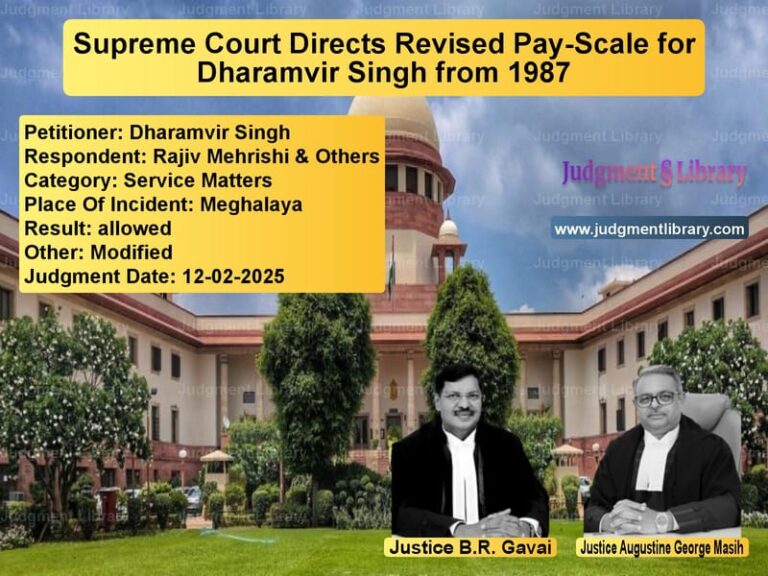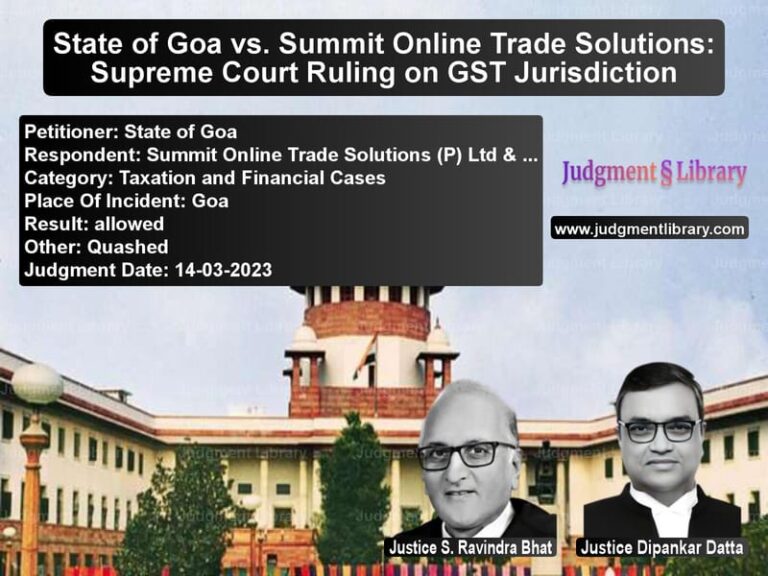Jharkhand Reservation Policy: Supreme Court Upholds ST Category Status in Service Allocation
The case of Akhilesh Prasad vs. Jharkhand Public Service Commission revolves around the dispute concerning the reservation status of Scheduled Tribe (ST) candidates who were appointed in undivided Bihar but later allocated to Jharkhand after its formation in 2000. The case specifically addresses whether such candidates can claim the benefits of reservation for promotions in Jharkhand.
Background of the Case
In 1994, Bihar Public Service Commission conducted the Graduate Level (Special) Competitive Examination to recruit Cooperative Development Officers. The appellant, Akhilesh Prasad, was selected under the Scheduled Tribe (Gond) category. His ST status was certified on June 3, 1995, and he was appointed on November 10, 1995.
With the enactment of the Bihar Reorganization Act, 2000, the state of Bihar was bifurcated, and Jharkhand was created. Prasad’s service was allocated to Jharkhand, where he continued working under the Cooperative Department.
Legal Issue: Promotion and Reservation Eligibility
In 2010, Jharkhand Public Service Commission (JPSC) issued Advertisement No. 9 of 2010 for filling up Deputy Collector posts through a limited departmental examination. However, it specified that only those holding a caste certificate issued by Jharkhand authorities would be eligible for reservation benefits.
Although Prasad scored 123.68 marks, exceeding the ST category cutoff of 113.70 marks, he was denied selection because his caste certificate was issued in Bihar. He challenged this in the Jharkhand High Court, which ruled in his favor. However, the Jharkhand government and JPSC appealed against the order.
Arguments of the Appellant
- Prasad argued that his ST status under Bihar’s reservation policy was valid even after the state’s bifurcation.
- He relied on Section 73 of the Bihar Reorganization Act, which protects service conditions of employees allocated to Jharkhand.
- He contended that the limited departmental examination was an internal promotion, not a fresh appointment, and hence, his reservation status should remain unchanged.
Arguments of the Respondents (Jharkhand Government & JPSC)
- The Jharkhand government argued that reservation benefits should only apply to candidates with caste certificates issued within Jharkhand.
- They contended that the recruitment process was a fresh appointment and not a promotion.
- They cited Advertisement No. 9/2010, which explicitly stated that caste certificates must be from Jharkhand authorities.
Supreme Court’s Ruling
The Supreme Court, led by Justices U.U. Lalit and P.S. Narasimha, ruled in favor of the appellant. The Court relied on its earlier judgment in Pankaj Kumar vs. State of Jharkhand (2021) and held that:
“Once an employee is allocated to a successor state, their service conditions, including reservation benefits, cannot be altered to their disadvantage.”
Key Observations:
- The limited departmental examination was a promotional exercise, not a fresh recruitment process.
- Section 73 of the Bihar Reorganization Act ensures that an employee’s service benefits remain unchanged.
- Requiring a new caste certificate from Jharkhand violated the principles of natural justice.
Final Judgment
- The Supreme Court reinstated the High Court’s order and directed JPSC to consider the appellant as an ST candidate.
- The ruling quashed Jharkhand’s restriction on caste certificates issued by Bihar.
- It reaffirmed that state bifurcation does not invalidate an employee’s reservation status.
Impact of the Judgment
This ruling sets a significant precedent for employees affected by state bifurcation:
- Ensures continuity of reservation benefits for allocated employees.
- Clarifies that limited departmental exams are promotions, not fresh recruitments.
- Prevents arbitrary denial of reservation benefits based on technicalities.
Conclusion
The Supreme Court’s decision in Akhilesh Prasad vs. Jharkhand Public Service Commission reinforces the principle that administrative reorganization cannot disadvantage reserved category employees. This ruling safeguards the rights of individuals who were appointed under previous state administrations and ensures they receive the benefits they were promised.
Petitioner Name: Akhilesh Prasad.Respondent Name: Jharkhand Public Service Commission & Ors..Judgment By: Justice Uday Umesh Lalit, Justice Pamidighantam Sri Narasimha.Place Of Incident: Jharkhand.Judgment Date: 26-04-2022.
Don’t miss out on the full details! Download the complete judgment in PDF format below and gain valuable insights instantly!
Download Judgment: akhilesh-prasad-vs-jharkhand-public-ser-supreme-court-of-india-judgment-dated-26-04-2022.pdf
Directly Download Judgment: Directly download this Judgment
See all petitions in Promotion Cases
See all petitions in Employment Disputes
See all petitions in Recruitment Policies
See all petitions in Judgment by Uday Umesh Lalit
See all petitions in Judgment by P.S. Narasimha
See all petitions in allowed
See all petitions in Quashed
See all petitions in supreme court of India judgments April 2022
See all petitions in 2022 judgments
See all posts in Service Matters Category
See all allowed petitions in Service Matters Category
See all Dismissed petitions in Service Matters Category
See all partially allowed petitions in Service Matters Category







